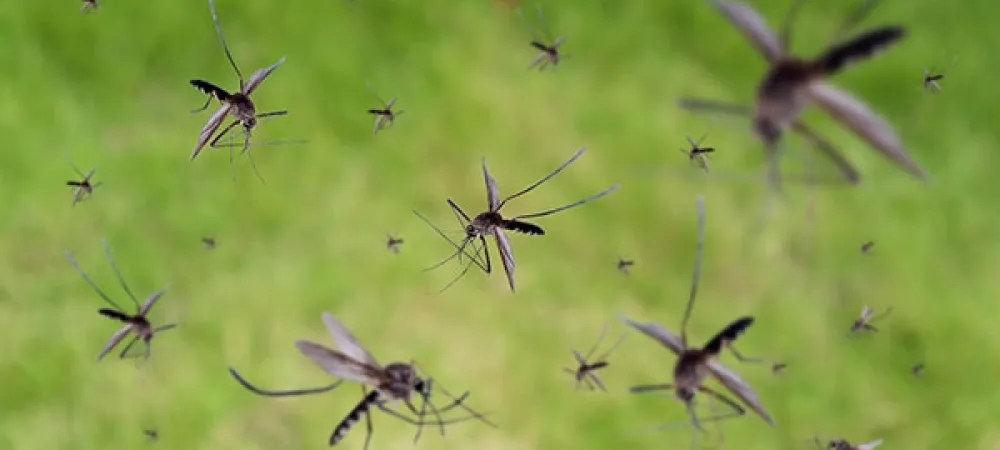Understanding and Combating Florida's Mosquito Problem

Florida's warm, humid climate and abundant water sources create the perfect breeding ground for mosquitoes, making these tiny insects a significant nuisance and potential health threat for residents and visitors alike. In this comprehensive guide, we'll explore the impact of mosquitoes in Florida, focusing on specific geographic areas, relevant statistics, and effective control methods.
Florida's Mosquito Hotspots
While mosquitoes are present throughout Florida, certain areas experience more severe infestations due to their unique environmental conditions:
1. Everglades: The vast wetlands of the Everglades provide an ideal habitat for mosquitoes, with species like Aedes aegypti and Culex quinquefasciatus thriving in the region.
2. Coastal Areas: Cities along Florida's extensive coastline, such as Miami, Fort Lauderdale, and Hollywood, face significant mosquito challenges due to the combination of saltwater marshes and urban environments.
3. Central Florida: The numerous lakes and wetlands in central Florida, including the Orlando area, create ample breeding grounds for mosquitoes.
4. Florida Keys: The subtropical climate and abundance of standing water in the Florida Keys make them particularly susceptible to mosquito infestations.
Three Most Common Mosquito Species in Florida
Florida is home to about 80 mosquito species, but a few are particularly problematic:
- Aedes aegypti: Known as the yellow fever mosquito, this species is a primary vector for dengue, Zika, and chikungunya viruses.
- Aedes albopictus: The Asian tiger mosquito can transmit various viruses, including dengue and Eastern equine encephalitis.
- Culex nigripalpus: A common Florida mosquito that can transmit West Nile virus and St. Louis encephalitis.
In recent years, an alarming increase in mosquito populations and related diseases has occurred in Florida and the southeastern United States. According to the Florida Department of Health, the state has seen a concerning rise in mosquito-borne diseases:
- In 2020, Florida reported 70 cases of locally acquired dengue fever, the highest number in recent years [1].
- West Nile virus cases fluctuate annually, with 17 reported cases in 2020 and 33 in 2021 [2].
- The 2016-2017 Zika virus outbreak in Florida resulted in 300 locally acquired cases, highlighting the potential for rapid spread of mosquito-borne diseases [3].
Mosquito Population Increases in the Sunshine State
A study published in the Journal of Medical Entomology found that Aedes albopictus populations in Florida have increased by approximately 220% between 2005 and 2016 [4]. This dramatic rise is attributed to several factors:
- Climate change leading to warmer temperatures and increased rainfall
- Urbanization creates more artificial breeding sites
- Global trade and travel facilitate the spread of invasive mosquito species
Health Implications of Mosquito Infestations
The abundance of mosquitoes in Florida isn't just a nuisance; it poses significant health risks to residents and visitors. Mosquitoes in Florida are capable of transmitting several diseases, each with its own set of concerns:
Dengue Fever
Dengue is a viral infection that can cause severe flu-like symptoms and, in some cases, lead to life-threatening complications. Florida has seen periodic outbreaks, with the Keys being particularly vulnerable. The 70 locally acquired cases reported in 2020 underscore the ongoing risk of dengue transmission in the state. Symptoms include high fever, severe headache, and joint pain, while severe cases can lead to plasma leakage, fluid accumulation, and organ impairment.
West Nile Virus
While many infected individuals show no symptoms, West Nile virus can cause serious neurological problems in some cases. Florida regularly reports cases, with the virus being endemic in certain areas. The fluctuating annual case numbers (17 in 2020, 33 in 2021) highlight the unpredictable nature of West Nile virus transmission. Most infected people remain asymptomatic, but about 1 in 5 develop fever and other symptoms, with a small percentage facing severe neurological complications.
Eastern Equine Encephalitis (EEE)
Though rare, EEE is one of the most severe mosquito-transmitted diseases, with a 30% mortality rate. Florida reports a few cases each year, primarily in the northern part of the state. Symptoms progress rapidly from sudden onset of headache and high fever to disorientation and coma, with survivors often facing significant brain damage.
Zika Virus
The 2016-2017 Zika outbreak in Florida raised significant concerns due to its potential to cause birth defects. While local transmission has since been controlled, the risk remains present. The outbreak, which resulted in 300 locally acquired cases, demonstrated how quickly mosquito-borne diseases can spread in Florida's climate. While many infected individuals have mild or no symptoms, Zika can cause severe birth defects, including microcephaly, if contracted during pregnancy.
Other Mosquito-Borne Diseases
Florida's mosquitoes can also transmit other diseases, albeit less commonly, including Chikungunya, St. Louis Encephalitis, and Yellow Fever. These diseases can cause a range of symptoms, from debilitating joint pain to severe neurological complications, further emphasizing the importance of comprehensive mosquito control measures.
The presence of these various mosquito-borne diseases in Florida underscores the importance of robust mosquito control measures and public health initiatives. As climate change potentially expands the range and activity periods of mosquitoes, vigilance and proactive management become increasingly crucial to protect public health.
Effective Mosquito Control Strategies
Combating Florida's mosquito problem requires a multi-faceted approach. Here are some effective strategies employed by pest control experts and public health officials:
1. Integrated Mosquito Management (IMM)
IMM combines various control methods to achieve maximum effectiveness, including surveillance, source reduction, biological control, and chemical control. This comprehensive approach allows for targeted and efficient mosquito population management.
2. Advanced Treatment Systems
Innovative solutions like the In2Care system offer targeted and environmentally friendly mosquito control through strategically placed water-filled buckets with biological agents. These systems provide effective, long-term mosquito management with monthly maintenance to ensure continuous protection.
3. Public Education and Prevention
Empowering residents with knowledge and tools to prevent mosquito breeding is crucial for effective control. This includes educating the public about eliminating standing water, using mosquito repellents, and improving home protection through proper screening and maintenance.
4. Year-Round Protection
In Florida's climate, mosquito control isn't just a seasonal concern. Year-round protection programs, like those offered by East Coast Pest Control, provide continuous defense against mosquitoes through regular treatments and monitoring, ensuring consistent protection throughout the year.
Mosquito Control is a Community Effort
Effectively managing Florida's mosquito problem requires a collaborative effort between pest control professionals, public health agencies, and residents. By staying informed about the risks, implementing preventive measures, and utilizing professional mosquito control services, Floridians can reclaim their outdoor spaces and reduce the threat of mosquito-borne diseases.
As climate change and urbanization continue to influence mosquito populations, ongoing research and adaptation of control strategies will be crucial. With vigilance and proactive measures, Florida can continue to be a paradise for residents and tourists alike without the constant buzz and bite of its tiniest inhabitants.
References:
1. Florida Department of Health. (2021). Mosquito-Borne Disease Surveillance.
2. Centers for Disease Control and Prevention. (2022). West Nile Virus: Final Cumulative Maps & Data for 1999-2021.
3. Likos, A., et al. (2016). Local Mosquito-Borne Transmission of Zika Virus - Miami-Dade and Broward Counties, Florida, June-August 2016. MMWR Morb Mortal Wkly Rep.
4. Hopperstad, K.A., & Reiskind, M.H. (2016). Recent Changes in the Local Distribution of Aedes aegypti (Diptera: Culicidae) in South Florida, USA. Journal of Medical Entomology.
